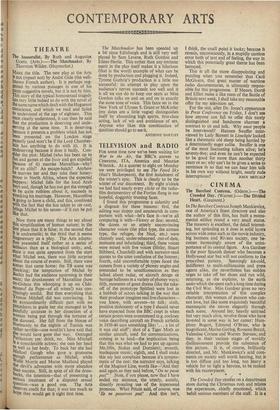TELEVISION and RADIO FOR some time now we've been waiting
for War in the Air, the BBC's answer to Cinerama, ITA, America and Maurice Winnick. At a quarter to eight on Monday we were privileged to see The Fated Sky (that's Shakespeare), the first instalment of the winter's epic. This is clearly to be the winter of our discontent. By eight o'clock we had had nearly every cliche of the radio- film documentary of the Forties flung in our hopeful, doggishly trusting faces.
I found this programme a calamity and a disgrace for these reasons: first, the editing was sloppy and amateurish in com- parison with what—let's face it—we're all comparing it with—Victory at Sea; second, the dozen or so utterly unconvincing character voices (the pilot type, the airman type, the refugee, the Nazi, etc.) were clumsily used, under-rehearsed, out-of-date, insincere and infuriating; third, these voices were mixed with live voices (Hitler, Stuart Hibberd, Churchill) and with narrator-read quotes to the utter confusion of the listener; fourth, odd uncomfortable types faced the camera from a variety of phoney angles and pretended to be unselfconscious as they talked about radar, or aircraft design or barrage balloons in a variety of phoney ways; fifth, moments of great drama (like the take- off of the prototype Spitfire) were lost in a hubbub of actors talking in the way that their producer imagines real live characters— you know, with accents—to talk; sixth, positive dishonesty of a type I should never have expected from the BBC crept in when certain points were overstressed (e.g. cockney voice describing aircraft on French airfields in 1939-40 says something like: a lot of it was old stuff'; shot of a Tiger Moth or similar aircraft, used for communications, coming in to land—the implication being that this was what we had to put up against Me.109s, Stukas and Domiers); seventh, inadequate music; eighth, and I shall make this my last complaint because it's sympto- matic of the rest: the narrator says, talking of the Maginot Line, words like—`And they said again as they said before, "On ne passe pas!"' Note, if you please, now that I have ended my sentence, the utterly, auntily, drearily revealing use of the impersonal pronoun. What Main said, of course, was 'Ile ne passeront past' And this isn't,
I think, the small point it looks; because II reveals, unconsciously, in a stupidly careless error both of text and of feeling, the way in which this potentially great theme has been betrayed.
This is all the more disappointing and puzzling when you remember that Cecil McGiveni, that great master of wartime radio documentaries, is ultimately respon- sible for this programme. If Messrs. Dodd and Elliot make a like mess of the Battle of Britain next week, I shall take any reasonable offer for my television set.
For the rest, after Dr. Jones's appearance in Press Conference on Friday, I don't see how anyone can fail to offer this rarely distinguished and handsome charmer a contract to sit and talk. Why must people be interviewed? Hannen Swaffer inter- viewed by Lady Barnett in Limelight looked like a rheumatic old sheep being harried by a determinedly eager collie. Swaffer is one of the most fascinating talkers alive; he's seventy-five; and even he can't be expected to be good for more than another thirty years or so; why can't he be given a series to reminisce in so that we can hear him talk in his own way without bright, nearly rude


































 Previous page
Previous page